 Petzlover
Petzlover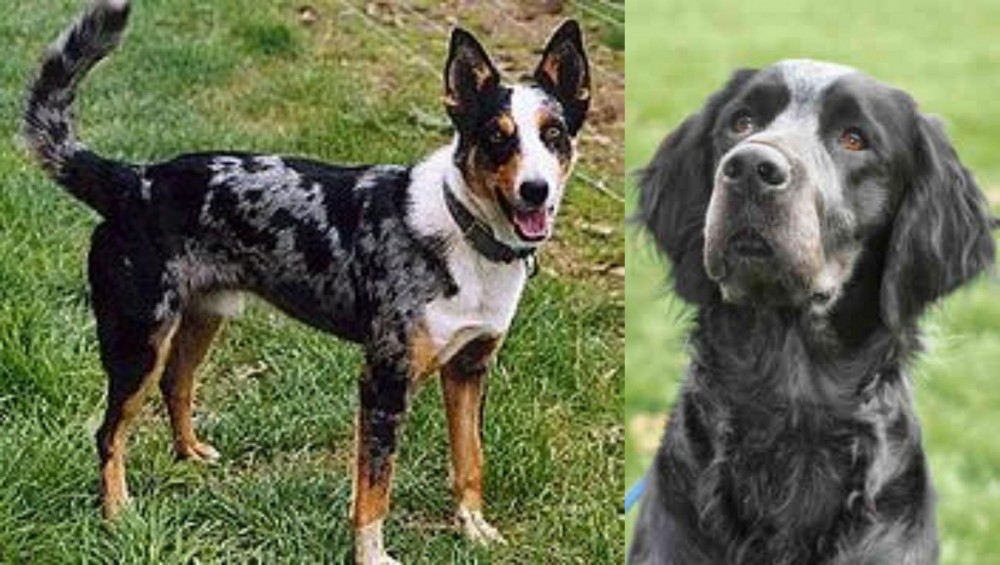 German Coolie is originated from Australia but Picardy Spaniel is originated from France. Both German Coolie and Picardy Spaniel are having almost same height. Both German Coolie and Picardy Spaniel are having almost same weight. German Coolie may live 4 years more than Picardy Spaniel. Both German Coolie and Picardy Spaniel has almost same litter size. German Coolie requires Low Maintenance. But Picardy Spaniel requires Moderate Maintenance
German Coolie is originated from Australia but Picardy Spaniel is originated from France. Both German Coolie and Picardy Spaniel are having almost same height. Both German Coolie and Picardy Spaniel are having almost same weight. German Coolie may live 4 years more than Picardy Spaniel. Both German Coolie and Picardy Spaniel has almost same litter size. German Coolie requires Low Maintenance. But Picardy Spaniel requires Moderate Maintenance
 The German Coolie is misnamed as it is an Australian bred dog and often called the Australian Koolie or Coolie. This Australian breed is more often just called a Coolie. The breed is a typical herding breed and a working dog that needs a job all the time. They have been a favorite of Australians since the late 1800’s when local dogs were bred with British working dogs.
The German Coolie is misnamed as it is an Australian bred dog and often called the Australian Koolie or Coolie. This Australian breed is more often just called a Coolie. The breed is a typical herding breed and a working dog that needs a job all the time. They have been a favorite of Australians since the late 1800’s when local dogs were bred with British working dogs.
Although all Coolie’s are not the same. Within the breed there is a lot of variation. This is because the Coolie was bred individually for different regions in Australia. In a very different writing the Koolie Club of Australia does not define the Coolie breed on confirmation as all other purebred dogs are defined. Instead the Coolie is defined by ability to work. In light of this most Coolie breeders state that the Coolie is a breed and the variations you see among regions are types within the breed.
As a herding dog, the Coolie brought a lot of skill to the Australian farmers and sheep herders. The Coolie will round up the sheep and bring them back to their enclosure at the shepherd’s command. They are upright, silent, working dogs. Not only do they herd sheep they are important at sheering to “cut out” the sheep or assist in the close quarters of lambing.
In Queensland North and New South Wales, the Coolie is medium boned, tall and agile ready to herd cattle over a long stretch of miles. In the Snowy Mountains of New South Wales and the Hunter Valley Region, the Coolie is shorter and thicker in order to be able to get cattle that are lying low out from the gullies and dense bush. The Coolies found in Victoria are the smallest of all.
No matter where they live and work, the Coolie is bred to help the workers there, the farmers, the stockman, and the grazier. All Coolies are adaptable and very agile. They all have a strong willfulness to accomplish what they are asked to do. The ancestors of these various Coolie was the British Collie – a smooth coated, blue merle. This Collie was crossed with the Black and Tan Collie from the Scottish Highlands. It is believed that these are the same Collie breeds that came to Australia to create the Heeler.
The name may come from the German immigrants working in South Australia and unable to pronounce Collie incorrectly they called the dogs German Coolies. There is also a fraction of German breeders who believe that the German Tiger dog was brought to Australia in the 18th century and then when the Collies came they were bred together. Many Coolie breeders have records showing that the breed has been in Australia for at least 160 years. It is also believed that the Border Collie and Kelpie (Blue Heeler) were mixed into the breed at sometime as well.
No bench standard exists for the German Coolie even though there is the Koolie Club of Australia. The mission of the club is to protect, preserve and promote the breed. The Australian Sporting Register was recognizing the Coolies in 2004. They are eligible to participate in the Australian National Kennel Council sanctioned sporting trials. They participate in Queensland, New South Wales and Victoria through the individual states sporting register. Here they participate in herding, jumping, obedience, agility and tracking.
Several other recognitions as a herding breed soon followed. The Australian Shepherd Club of America, the American Herding Breed Association, were followed by recognition from others as well. They are not recognized by the American Kennel Club (AKC).
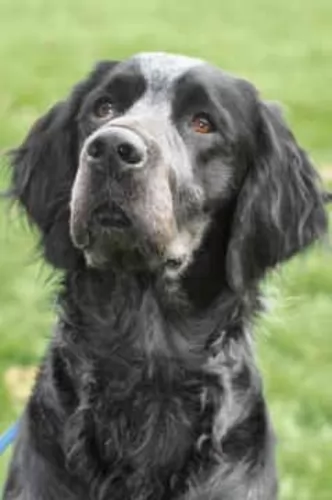 The Picardy Spaniel hails from France and has always been used as a gundog, having been crossed with different British hunting dogs.
The Picardy Spaniel hails from France and has always been used as a gundog, having been crossed with different British hunting dogs.
While this dog breed is related to the Blue Picardy Spaniel, the Picardy is the older of the two breeds. It has always been sought after by the French nobility for its hunting skills and the fact that its weather resistant coat allowed it to hunt in all kinds of weather conditions.
The dog’s popularity waned in the early 20th century. The UKC have recognized the Picardy Spaniel as a Gun Dog and the breed has also been accepted within the FCI as a Pointing dog group.
 With their strong ancestry among the family of collies and herders, the German Coolie shares the look of collies and shepherds. Even though they differ from region to region and there is no actual standard, they are medium sized dogs with blue or brown eyes or even one of each. The ears are folded over on top when relaxed but they are rigid and straight when he is more alert. The nose is either chocolate or red depending on the color of their coat.
With their strong ancestry among the family of collies and herders, the German Coolie shares the look of collies and shepherds. Even though they differ from region to region and there is no actual standard, they are medium sized dogs with blue or brown eyes or even one of each. The ears are folded over on top when relaxed but they are rigid and straight when he is more alert. The nose is either chocolate or red depending on the color of their coat.
They can have either a long, medium or short coat but most owners want the short coat that is smooth as well. The coat can be one color – red/chocolate or black; Bi – red/white or black/white; Tri – solid black or red with white and brown; Tri merle -merle with white and brown; Merle – red merles and blue merles. Regardless of color, the German Coolie has the look of a collie or German Shepherd.
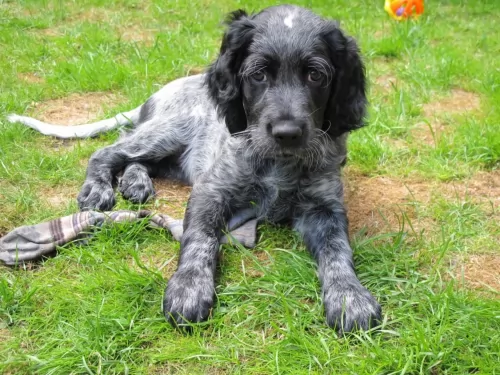 The Picardy Spaniel is larger than other spaniels. It is described as a medium sized dog, standing at 56 – 61cm in height and weighing between 20 and 25 kilograms. The body of the spaniel is squarely built and muscular body. The dog has long floppy ears and the coat which is shortish in areas except for feathering around the legs and belly can vary in colour from red to chestnut brown to sandy and chocolate. The tail is long and feathered.
The Picardy Spaniel is larger than other spaniels. It is described as a medium sized dog, standing at 56 – 61cm in height and weighing between 20 and 25 kilograms. The body of the spaniel is squarely built and muscular body. The dog has long floppy ears and the coat which is shortish in areas except for feathering around the legs and belly can vary in colour from red to chestnut brown to sandy and chocolate. The tail is long and feathered.
The Picardy Spaniel is a docile breed of dog and makes a great family pet, loving being playful with the children in the home and getting on well with other dogs. He is gentle but sociable and intelligent too and is easy to train and socialize.
Although he has been used as a hunting dog he can slot into life in the city or the countryside. He can be indoors or outdoors and still be happy, so long as his family members are close by.
He is an active dog though, and won’t be content to be sitting around for too long, loving nothing more than to be chasing a ball or going for a walk with you.
 Yes, they can be very friendly with children is they are socialized and supervised.
Yes, they can be very friendly with children is they are socialized and supervised.
They have enough stamina to work for 14 hours a day.
They are very adaptable. They can be calm and steady when working a mother and baby lamb and then be able to forcefully move steers, bull, rams or weathers.
The breed is highly intelligent, and their learning ability is excellent because they want to please you.
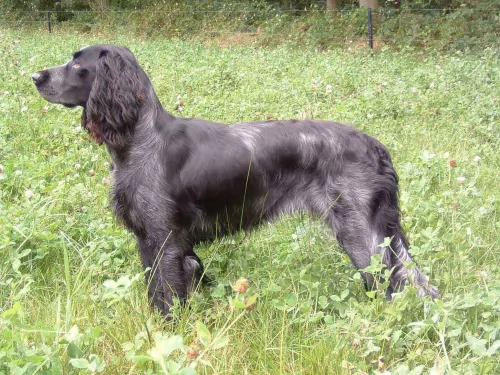 The Picardy Spaniel is a docile dog who forms strong bonds with his human family.
The Picardy Spaniel is a docile dog who forms strong bonds with his human family.
He doesn’t gel easily with strangers though, but socialization and training will at least make him well behaved among strangers.
A well-mannered Picardy Spaniel is a joy in the home, and this gentle dog is guaranteed to make you the most wonderfully loyal and loving pet and companion.
 This is a relatively healthy breed without many genetic disorders found in purebreds due to the 160 years they have spent fairly isolated and allowing natural selection to take its course.
This is a relatively healthy breed without many genetic disorders found in purebreds due to the 160 years they have spent fairly isolated and allowing natural selection to take its course.
In Merle dogs there can be deafness and/or blindness. If you breed a solid to a merle you can eliminate that.
These are not inherited but rather acquired due to the immense amount of jumping and running.
Rare but it does occur and can be fatal if not treated
 Without any major health issues, your Picardy can reach 14 years of age and possibly even older. A couple of common dog conditions to be on the watch for include:
Without any major health issues, your Picardy can reach 14 years of age and possibly even older. A couple of common dog conditions to be on the watch for include:
Your beautiful Picardy Spaniel has floppy ears and this opens up the tendency to suffer with ear infections. The inside of the ears are moist and hot and you as the dog owner can try to keep the inside of the ear clean and dry.
He is a dog that loves water too, and swimming encourages dampness. If you prefer not to work on the inside of the ears, dog groomers or your vet can clean the ears for you. An ear infection can be painful for your pet and it will require veterinary intervention.
These are dogs which can pick up weight quite easily. Dogs which are overweight are more prone to developing cancer, diabetes and heart disease, not to mention joint problems.
Other problems to look out for include cancer, bloat, dental disease and parasites.
 Break meals into 3 a day feeding a high quality dry puppy food designed for dogs of his size. 11/2 to 2 cups per day.
Break meals into 3 a day feeding a high quality dry puppy food designed for dogs of his size. 11/2 to 2 cups per day.
Break meals into 2 a day feeding a high quality dry adult food designed for dogs of his size.
Traditionally good health. Great energy, intensity and devotion to work and owner.
This is an energetic dog that loves to work and needs to work. Regular routine exercise is needed daily. He needs to be stimulated mentally and physically. Find him a job. Make sure he knows what you want him to do. They work well with a human partner in games such as agility, tracking, flyball and herding. They need a large yard and a lot of play time. They are not couch potatoes and would be unhappy if they were stuck in a house or apartment
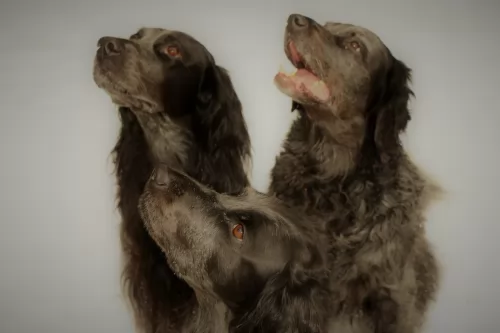 Your Picardy has a thick coat which sheds and the coat should be brushed at least twice a week to prevent matting. The ears of the Picardy Spaniel require special attention. Because they are long they will need to be cleaned and kept dry otherwise an ear infection can develop.
Your Picardy has a thick coat which sheds and the coat should be brushed at least twice a week to prevent matting. The ears of the Picardy Spaniel require special attention. Because they are long they will need to be cleaned and kept dry otherwise an ear infection can develop.
At the same time, check your pet over for ticks and fleas, check his eyes, keep the nails trimmed, and check inside his mouth for rotting teeth which can be the source of many health problems if left untreated.
If you have a puppy, you will need to provide 4 bowls of food in a 24 hour period. Check on the directions provided on the food packaging to see how much to feed your puppy.
By the time your Picardy is one year of age, he can move over to 2 bowls of food a day. Only the highest quality commercially manufactured food will be good enough for your dog. Food and its quality impacts the health and longevity of your pet.
Apart from dry kibble, try and provide some home-made food, keeping it as simple as possible. Dogs thrive on simple, consistent foods. Chopped up boiled chicken, brown rice, sweet potatoes, spinach and carrots added to the kibble now and then will thrill your pet. Occasionally you can also add in some raw meat.
Avoid feeding your dog things like coffee, chocolates, popcorn, nuts and onions as all these will just upset your dog's digestive system. The secret is to keep things simple and nutritious.
Make sure your pet always has access to fresh, cool water.